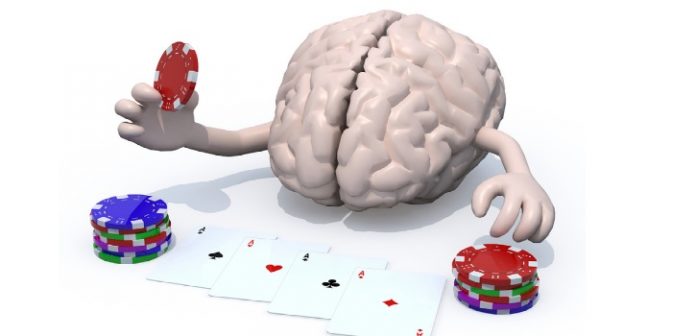To gamble effectively, you need to have the correct mindset. That means that you have to have good brain development. A developed brain allows you to form gambling strategies, and it does not happen automatically. Keep reading to find the ages at which you are able to think about strategy.

Developmental Levels
Piaget’s theory of the development of the brain states children move through four different stages of brain development. Obviously, children are not going to gamble during the sensorimotor stage, which is from birth to 2 years; or the preoperational stage, which is from 2 to 7 years. However, children begin forming the frameworks for gambling and gameplay in both the concrete operational stage, which is from ages 7 to 12, and the formal operational stage, which is from 12 years old and older.
Concrete Operational Stage
In the concrete operational stage, children begin to think logically about things that are concrete. In other words, they are able to think logically about the events they see or the sounds they hear. They are also able to organize their thoughts and, given specific information, they begin to develop the ability to reason and, thus, reach a concrete conclusion. This means that children are able to practice and play games, but they are only beginning to formulate a strategy.
Formal Operational Stage
Children really cannot begin to think abstractly until they begin adolescence. During the formal operational stage, teenagers and young adults are able to think about abstract concepts, such as solving a problem. They have also gained the ability to reason everything from a general principle to specific pieces of information. People at the formal operational stage are also able to see multiple solutions to a problem, which means they are ready for gaming and problem-solving, which is at the heart of gambling.
Strategic Thinking
 Strategic thinking is vital in gaming. Strategic thinking is the ability to anticipate the actions of another player or gamer and respond to those actions after thinking about what move to make. It is the anticipation of what another player will do that differentiates the mature gamer from someone who is not yet ready for logical strategic thinking.
Strategic thinking is vital in gaming. Strategic thinking is the ability to anticipate the actions of another player or gamer and respond to those actions after thinking about what move to make. It is the anticipation of what another player will do that differentiates the mature gamer from someone who is not yet ready for logical strategic thinking.
Strategic thinking is especially important for gambling because it allows the gamer to assess his or her risk within the game. Strategic thinkers analyze risk and reward patterns and how specific moves can minimize or maximize their chances of being successful in gambling.
Where is the Sweet Spot?
Many researchers think that the sweet spot in terms of proficiency in gambling is in the mid- to late-20s because, at that age, there is less of a tendency to do impulsive things, such as gamble away money you don’t have. This may not sound like an issue, but it is when you consider that adolescents have a significant problem with both impulsivity and gambling. Teenagers and young adults who have access to online gaming but have not yet gained an ability to assess risk have the most difficulty. This inability to assess risk contributes to mental health issues, problems with family, and additional substance abuses. Researchers have noted that for some teenagers and young adults, it is difficult for them to think about their actions before they act, which can lead to problems with gambling because they do not think about their gaming strategies.
Impulsivity
 Adults in their 20s and 30s, however, appear to be more focused. Research indicates that individuals in adulthood demonstrate less impulsivity than teenagers or young adults in three different areas. First, adults who were in their 20s and 30s demonstrated a greater ability to pay attention to a task, which is extremely important in gambling. Not only do you have to focus on you and your play, but, if you are in a casino, you also have to focus on the other players at the table, as well as the dealer. Second, adults who are older are less likely to act without thinking first, which is important in determining strategy. Third, older adults plan several steps ahead, and prepare for their moves in a strategy game, while younger adults have difficulty planning ahead. Young adults also struggle with delayed gratification. In studies, young adults who were gambling were told that they could not cash out their winnings for a period of time. They became frustrated, and, many times, they abandoned the game rather than wait until they could cash out their winnings.
Adults in their 20s and 30s, however, appear to be more focused. Research indicates that individuals in adulthood demonstrate less impulsivity than teenagers or young adults in three different areas. First, adults who were in their 20s and 30s demonstrated a greater ability to pay attention to a task, which is extremely important in gambling. Not only do you have to focus on you and your play, but, if you are in a casino, you also have to focus on the other players at the table, as well as the dealer. Second, adults who are older are less likely to act without thinking first, which is important in determining strategy. Third, older adults plan several steps ahead, and prepare for their moves in a strategy game, while younger adults have difficulty planning ahead. Young adults also struggle with delayed gratification. In studies, young adults who were gambling were told that they could not cash out their winnings for a period of time. They became frustrated, and, many times, they abandoned the game rather than wait until they could cash out their winnings.
Adults in Middle Age and Beyond

Adults in middle age also tend to be more methodical in their approach to gambling and are able to strategize their gaming habits, which makes them better players. In addition, adults in middle age are less impulsive and are willing to wait for gratification, even hours or days, if necessary.
In addition, adults in middle age are able to focus on a task for a long period of time, which means they are able to sit through hours of games without losing their focus. Many adults in middle age also enjoy gaming and enjoy the socialization that goes with playing at the gaming tables or talking to their friends about gaming.
Research has also shown that senior adults benefit from gaming. Although their reaction times have slowed, which is normal for aging adults, their ability to remember and adapt strategy has not changed. Older adults who play games of strategy have better memories, reaction times, and the ability to problem solve than adults who do not gamble. In fact, research has shown that older adults who gamble but do not overspend tend to have an elevated sense of mood and better hand-eye coordination, as well as reaction times than those senior adults who do not gamble. Gaming also helps with focus as well. While young adults have trouble focusing, some older adults have trouble focusing as well and need additional assistance.
It should be noted, however, that seniors, more than middle-aged adults, represent a group of problem gamers that is difficult to treat. Many older adults who are problem gamers have begun visiting casinos or increasing the frequency of their visits because they have lost a spouse or a companion, or they miss family and friends. Therefore, gambling becomes their only outlet. This is not a good situation for older adults to be in because they may be gambling for emotional reasons rather than for fun and enjoyment.
So, Which Age Group is the Best?
Every age group, from adults in their 20s to senior citizens, have an advantage over other adult groups, but for different reasons. Adults in their 20s have faster reaction times than other adults and are more familiar with the technology. However, they are often impulsive and do not think strategies through before acting on them. Adults in middle age may have the sweet spot in terms of gaming because they are not as impulsive as young adults, and have roughly the same reaction times. Seniors who play may have wisdom and experience that no other adults have, but their emotional playing may leave some vulnerable to a gaming addiction. Whatever age you are, you should go out and enjoy gaming as a form of entertainment.
Disclaimer: All images are copyright to their respective owners and are used by USA Online Casino for informational purposes only.










